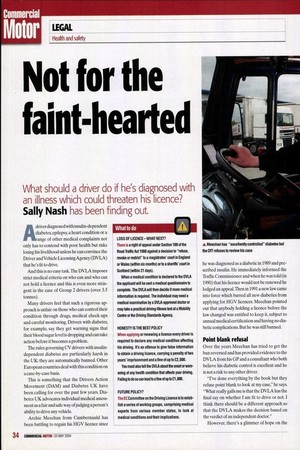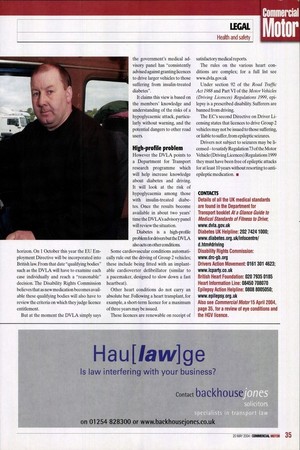Not for the faint-hearted
Page 32

Page 33

If you've noticed an error in this article please click here to report it so we can fix it.
What should a driver do if he's diagnosed with
an illness which could threaten his licence?
Sally Nash has been finding out. AAdriver diagnosed with insulin-dependent
d epilepsy, a heart condition or a ange of other medical complaints not only has to contend with poor health but risks losing his livelihood unless he can convince the Driver and Vehicle Licensing Agency (DVLA) that he's fit to drive.
And this is no easy task.The DVLA imposes strict medical criteria on who can and who can not hold a licence and this is even more stringent in the case of Group 2 drivers (over 3.5 tonnes).
Many drivers feel that such a rigorous approach is unfair on those who can control their condition through drugs, medical check-ups and careful monitoring. Drivers with diabetes, for example, say they get warning signs that their blood sugar level is dropping and can take action before it becomes a problem.
The rules governing CV drivers with insulindependent diabetes are particularly harsh in the UK: they are automatically banned. Other European countries deal with this condition on a case-by-case basis.
This is something that the Drivers Action Movement (DAM) and Diabetes UK have been calling for over the past few years. Diabetes UK advocates individual medical assessment as a fair and safe way ofjudging a person's ability to drive any vehicle. Archie Meechan from Cumbernauld has been battling to regain his HGV licence since
he was diagnosed as a diabetic in 1989 and prescribed insulin. He immediately informed the Traffic Commissioner and when he was told (in 1990) that his licence would not be renewed he lodged an appeal.Then in 1991 a new law came into force which barred all new diabetics from applying for HGV licences. Meechan pointed out that anybody holding a licence before the law changed was entitled to keep it, subject to annual medical certification and having no diabetic complications. But he was still banned. Point blank refusal
Over the years Meechan has tried to get the ban reversed and has provided evidence to the DVLA from his GP and a consultant who both believe his diabetic control is excellent and he is not a risk to any other driver.
"I've done everything by the book but they refuse point blank to look at my case," he says. "What really galls me is that the DVLA has the final say on whether I am fit to drive or not. I think there should be a different approach so that the DVLA makes the decision based on the verdict of an independent doctor." However, there's a glimmer of hope on the
horizon. On 1 October this year the EU Employment Directive will be incorporated into British law. From that date "qualifying bodies" such as the DVLA will have to examine each case individually and reach a "reasonable" decision. The Disability Rights Commission believes that as new medication becomes available these qualifying bodies will also have to review the criteria on which they judge licence entitlement. But at the moment the DVLA simply says
the government's medical advisory panel has "consistently advised against granting licences to drive larger vehicles to those suffering from insulin-treated diabetes".
It claims this view is based on the members' knowledge and understanding of the risks of a hypoglycaemic attack, particularly without warning, and the potential dangers to other road users. High-profile problem
However the DVLA points to a Department for Transport research programme which will help increase knowledge about diabetes and driving. It will look at the risk of hypoglycaemia among those with insulin-treated diabetes. Once the results become available in about two years' time the DVLA's advisory panel will review the situation.
Diabetes is a high-profile problem for drivers but the DVLA also acts on other conditions.
Some cardiovascular conditions automatically rule out the driving of Group 2 vehicles; these include being fitted with an implantable cardioverter defibrillator (similar to a pacemaker, designed to slow down a fast heartbeat).
Other heart conditions do not carry an absolute bar. Following a heart transplant, for example, a short-term licence for a maximum of three years may be issued. These licences are renewable on receipt of
satisfactory medical reports. The rules on the various heart conditions are complex; for a full list see www.dvla.gov.uk
Under section 92 of the Road Traffic Act 1988 and Part VI of the Motor Vehicles (Driving Licences) Regulations 1999, epilepsy is a prescribed disability. Sufferers are banned from driving. The EC's second Directive on Driver Licensing states that licences to drive Group 2 vehicles may not be issued to those suffering, or liable to suffer, from epileptic seizures. Drivers not subject to seizures may be licensed—to satisfy Regulation 73 of the Motor Vehicle (Driving Licences) Regulations 1999 they must have been free of epileptic attacks for at least 10 years without resorting to antiepileptic medication. •
LOSS OF LICENCE —WHAT NEXT?
There is a right of appeal under Section 100 of the Road Traffic Act 1988 against a decision to "refuse. revoke or restrict" to a magistrates' court in England or Wales (within six months) orb a sheriffs' court in Scotland (within 21 days).
When a medical condition is declared to the DVLA the applicant will be sent a medical questionnaire to complete. The DVLA will then decide if more medical information is required. The individual may need a medical examination by a DVLA-approved doctor or may take a practical driving-fitness test at a Mobility Centre or the Driving Standards Agency. HONESTY IS THE BEST POLICY
When applying or renewing a licence every driver is required to declare any medical condition affecting his driving. It's an offence to give false information to obtain a driving licence, carrying a penalty of two years' imprisonment and a fine of up to £2,500.
You must also tell the DVLA about the onset or worsening of any health condition that affects your driving. Failing to do so can lead to a fine of up to £1,000.
FUTURE POLICY?
The EC Committee on the Driving Licence is to establish a series of working groups, comprising medical experts from various member states, to look at medical conditions and their implications. CONTACTS Details of all the UK medical standards are found in the Department for Transport booklet Ala Glance Guide to Medical Standards of Fitness to Drivewww.dvla.gov.uk Diabetes UK Helpline. 202 7424 1000; www.diabetes.org.uk/infocentred.htm#driving Disability Rights Commission: www.drc-gb.org Drivers Action Movement: 0161 301 4623; www.lcparty.co.uk British Heart Foundation: 020 7935 0185 Heart Information Line: 08450 708070 Epilepsy Action Helpline: 0808 8005050; www.epilepsy.org.uk
Also see Commercial Motor15 April 2004, page 35, for a review of eye conditions and the HGV licence.




























































































































































































